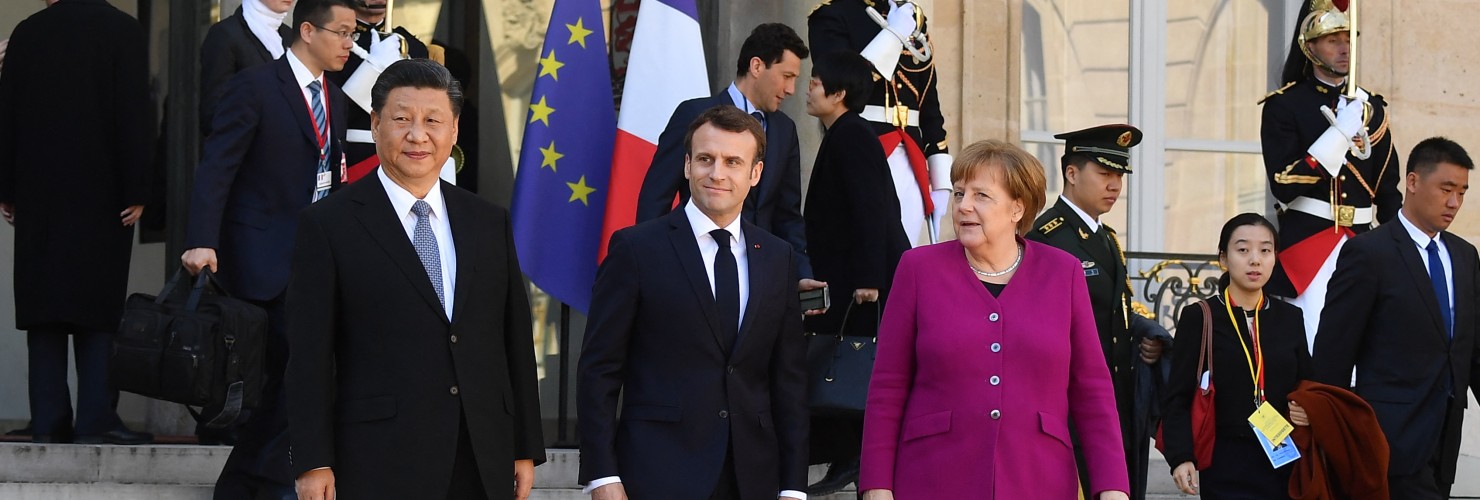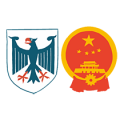

EU-China Opinion Pool: The Franco-German tandem
A constructive vehicle for shaping a common European China policy?
Franco-German coordination on China is not a new phenomenon. The two countries, alongside Italy, jointly pushed for development of an EU-wide investment screening mechanism in 2018. The “Franco-German tandem” captured the attention of a wider audience in March 2019 when French President Emmanuel Macron invited German Chancellor Angela Merkel and European Commission President Jean-Claude Junker to take part in a meeting with President Xi Jinping in Paris. Since late 2020, cooperation on China between Merkel and Macron has intensified considerably.
Merkel and Macron pushed forward the conclusion of negotiations on the EU-China Comprehensive Agreement on Investment (CAI). In a further attempt to show continuity between German and French EU Presidencies, they also joined EU leaders Ursula von der Leyen in a CAI-related video-call with Xi in January. Merkel and Macron also jointly sent a de-escalation signal amid tensions over mutual sanctions between the EU and China by jointly discussing climate cooperation with Xi in April 2021. Now, there are signals that the pair may be planning to arrange their first joint visit to China this summer.
Intensified cooperation between the two most influential European capitals can help provide a clearer and stronger message. Some member states have, however, voiced reservations over France and Germany taking too dominant a role in exchanges between the EU and China. Angela Merkel will not run for another term as German Chancellor in September, and Emmanuel Macron faces challenging Presidential elections next year. The two leaders’ personal circumstances notwithstanding, it remains worth asking:
“Is a ‘Franco-German tandem’ on China a constructive vehicle for shaping a common European China policy?”
We have asked our current research fellows Irène Hors, Ariane Reimers, Sari Arho Harvén, Plamen Tonchev and our EU-China Analyst Grzegorz Stec to share their views.
Irène Hors
President of the France China Foundation’s Steering Committee

Of course, on China as on all priority dossiers, France and Germany discuss and coordinate. But it is erroneous to say that a Franco-German tandem shapes a common European China Policy; rather, it strengthens Europe’s China policy and contributes to its implementation.
By inviting Merkel and Juncker to join him during Xi’s visit in March 2019, Macron sent the signal that France’s bilateral relations with China are aligned with EU’s China policy. It expressed France and Germany’s endorsement of the EU-China Strategic Outlook communicated in Strasbourg 10 days before - and the related paradigm shift. Last December, Merkel’s invitation to Michel, Von der Leyen and Macron to jointly address the Chinese President on the CAI, brought the discussion to a political level, facilitating a quick, political decision after 7 years of negotiations on the text. This approach extends to other international initiatives: in the April joint virtual meeting, Macron and Merkel engaged with Xi on UN commitments on climate change, biodiversity and the COVID crisis.
Other European Heads of State should feel free to do the same. Xi visits Europe every year, but went to Brussels in person only once, in 2014, mostly delegating, until recently, relations with the EU to Li Keqiang. Inviting representatives of the European institutions, and fellow State leaders, to the bilateral meetings they have with President Xi, and bringing to the table European and UN objectives, would help counter a country-by-country approach which, in the long run, goes against our interests.
Ariane Reimers
Television editor and correspondent at German ARD

No doubt it could be a constructive vehicle. It is always good for the advancement of the European Union when there are countries who lay the foundation for a common policy, who prepare and discuss possible strategies. The European Union needs these inputs. But it is counter-productive if this happens without integrating EU institutions and accommodating different opinions.
And here we see mixed messages. On the one hand, in 2019, Macron took the unprecedented step of inviting the Merkel Juncker to his talks with Xi Jinping in Paris – a clear signal for a stronger European approach in China policy. On the other hand, this year Macron and Merkel held talks with Xi on climate issues without an EU representative. And more important – it was the German-Franco alliance which led to the conclusion of the CAI despite criticism from other European countries. Germany has repeatedly condemned the 16+1/17+1 format and presumed especially Eastern European countries had conceded to Chinese interests in return for Chinese investments.
Now, the Franco-German cooperation on China leaves the impression that it favors national interests before the EU’s interests. The bilateral economic ties to China seem to be more important for them than a united European position. This is not helpful. The Franco-German tandem could be more successful when it emphasizes European unity and integrates other European countries and/or representatives of the European Institutions. To achieve this goal, both countries may need to back off a little bit from their own interests.
Sari Arho Havrén
Senior Advisor at Business Finland

“An ancient evil, long ago banished from our world, is now returning, and once again we are called upon to rise up and fight it,“ journalist Noah Smith wrote recently referring to the return of illiberalism. And China by far is the proudest flag bearer of authoritarianism in the world with its multifaceted repertoire of oppression.
China’s behavior has woken declining democracies around the world, if not to fight, but to defend the values democracies have been built on. President Biden has called for an alliance of democracies to contain China together. In the European Union, a bloc that boasts about its democratic values, Germany and France have formed a strategic autonomous axis where a handful of German and French corporations, and a worn globalist policy manual, direct the course. These actions have not made China more cooperative nor made it respect the rules based international order. Instead, Beijing got emboldened to challenge it. China’s approach aims to keep Europe divided and weak. Ultimately even French and German corporations will not benefit from rules set by an authoritarian great power.
While the actions of the Merkel-Macron tandem vis-à-vis China brilliantly portray how little value the democratic fundamentals of the EU have in realpolitik, this will not be a sustainable course of action for their successors in the future. Compartmentalization is coming to an end, talks of human rights behind closed doors play only to China’s court, and trade can no longer be separated from other policies. Davos time is over.
Plamen Tonchev
Head of Asia Unit at the Institute of International Economic Relations in Greece

The Franco-German axis has been instrumental for the promotion of a peaceful and prosperous united Europe since the conclusion of World War Two. More recently, the leading role of the tandem became even more prominent – and grudgingly accepted - in an EU-28 (now 27) with its notoriously slow and unwieldy decision-making procedures. Not surprisingly then, Germany and France have led in forging Europe’s China policy, largely in concert with key EU institutions. But this has never been a straightforward process.
Large industries in both Germany and France have predictably been eager to tap China’s enormous market, hence the zest with which Merkel and Macron pushed for the speedy signing of the CAI deal in late 2020 – even if many EU member states seem to prioritize exports to China over outward investment. Both Berlin and Paris support the EU’s “strategic autonomy” in-between Washington and Beijing, though this concept is still rather fuzzy and a militarily feeble Germany needs the security umbrella of the US-led NATO more than France does.
For the time being, Berlin and Paris will probably continue to set the tone in Sino-European relations. Merkel will presumably defend her positions on China by the end of her chancellorship next September. Macron will likely do the same - on the way to a tough battle for his reelection next April. But their “economy-first” approach to China is increasingly facing Washington; discomfort and a chorus of diverging views in the EU. The times they are a-changin’.
Grzegorz Stec
EU-China Analyst at MERICS

Franco-German consensus is necessary for shaping a common European China policy. And Berlin and Paris are capable of bringing European unity about. This has been recently demonstrated in their brokering of the EU recovery fund, and support for such initiatives as the EU’s Strategic Compass and Indo-Pacific strategy. Their tandem on China can be similarly constructive.
But it is not a given. The key question is the tandem’s inclusivity. President Macron’s invitation of Chancellor Merkel and President Juncker to jointly meet President Xi Jinping in Paris in 2019, sent a positive signal. But recent and upcoming Franco-German engagements with China do not include EU representatives. This more exclusive implementation of the tandem can also bring about a backlash from member states that feel sidelined by the two biggest European players, thereby dividing instead of uniting the EU. Several member states including Belgium, Italy and Poland voiced concerns over the Franco-German push for conclusion of CAI negotiations. As this was paired with toning down of the Leipzig ambitions for EU27+1 approach to China, smaller member states may be less inclined to ensure that the EU-level channel of engagement with China takes priority over alternative ones – which would come in handy amid 17(16)+1’s inertia.
So the tandem can be constructive - perhaps beyond leadership changes within it - if it operates as a core for building wider consensus and includes European institutions. While Berlin and Paris can move faster on China in only a tandem, an EU 27-wheeler, while harder to put into motion, could take the entire EU much further.

